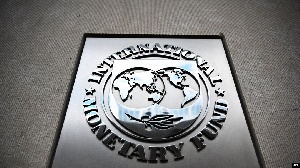Business News of Tuesday, 22 April 2025
Source: www.ghanawebbers.com
IMF warns global growth forecast will drop to 2.8% in 2025 due to trade uncertainties
The International Monetary Fund (IMF) predicts global growth will fall to 2.8 percent in 2025. This is down from the earlier estimate of 3.3 percent. The IMF cites global trade tensions as a key reason for this change.
The IMF notes that rising trade tensions and high policy uncertainty will impact economic activity significantly.
In its April 2025 World Economic Outlook (WEO) report, the IMF stated, “Global growth is projected to drop to 2.8 percent in 2025 and 3 percent in 2026.” This represents a cumulative downgrade of 0.8 percentage points from previous estimates.
For emerging markets and developing economies, growth is expected to slow to 3.7 percent in 2025 and 3.9 percent in 2026. Countries most affected by recent trade measures, like China, will see significant downgrades.
Advanced economies are projected to grow at only 1.4 percent in 2025. In the United States, growth is expected to slow to 1.8 percent, which is a decrease of 0.9 percentage points from earlier projections.
The euro area’s growth is forecasted at just 0.8 percent, down by 0.2 percentage points.
The report also indicates that global headline inflation will decline more slowly than previously expected. Inflation rates are projected at 4.3 percent for 2025 and 3.6 percent for 2026.
There are upward revisions for advanced economies and slight downward revisions for emerging markets regarding inflation in 2025.
The report warns that escalating trade wars could further reduce both near- and long-term growth potential.
It also highlights that shifting policies or negative sentiment may lead to asset re-pricing beyond what occurred after US tariffs were announced.
This could particularly affect economies already facing debt distress, leading to broader financial instability.
Demographic shifts and a shrinking foreign labor force may limit potential growth and threaten fiscal sustainability as well.
The lingering effects of the cost-of-living crisis could reignite social unrest due to depleted policy space and dim medium-term prospects.
Finally, many large emerging market economies may struggle as servicing high debt levels becomes more challenging under unfavorable global conditions.











